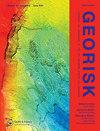尼日利亚城市居民的洪水和废物处理做法
IF 4.8
3区 工程技术
Q1 ENGINEERING, GEOLOGICAL
Georisk-Assessment and Management of Risk for Engineered Systems and Geohazards
Pub Date : 2023-09-26
DOI:10.3390/geohazards4040020
引用次数: 0
摘要
洪水发生率的上升引起了全球的关注。洪水是自然和人为因素共同造成的。在尼日利亚,洪水主要归因于人为因素,例如不良的废物处理做法和管理。尽管存在这种已知的联系,但目前还没有对城市居民进行实证研究,以了解他们的实际废物处理做法,并确定他们对自己的废物处理做法与他们日益经历的洪水之间的联系的认识。这项工作通过与居民和专家深入接触,通过混合方法的案例研究,在洪水易发城市哈科特港进行废物处理实践,填补了这一空白。问卷调查和定性访谈是主要的数据收集工具。该研究证实了居民的不良废物处理做法,并提供了有关各种形式的废物处理做法普遍存在的经验数据。这提供了关键信息,可以指导废物处理方式的必要改变,以消除这一已知的洪水驱动因素,实现可持续的洪水风险管理。这是相关的,因为废物管理是公民有权采取行动的领域之一。在这方面需要改变行为,必须通过有针对性的公众宣传加以鼓励。还建议让当地先锋倡导废物管理行为转变。我们鼓励有关当局采取更可持续的方法管理废物,确保提供废物处理服务,并设立足够的奖惩措施,以吓阻违法者。本文章由计算机程序翻译,如有差异,请以英文原文为准。
Flooding and Waste Disposal Practices of Urban Residents in Nigeria
The rising incidence of flooding is a cause for global concern. Flooding is caused by both natural and human factors. In Nigeria, flooding has been attributed chiefly to human factors, such as poor waste disposal practices and management. Despite this known link, no empirical study is known to have engaged with urban residents to understand their actual waste disposal practices and ascertain their knowledge of the connection of their waste disposal practices to the flooding they are increasingly experiencing. This work fills this gap via an in-depth engagement with residents and experts on their waste disposal practices in the flood-prone city of Port Harcourt via a mixed-methods case study. Questionnaire surveys and qualitative interviews served as the primary data collection tools. The study confirms the poor waste practices of residents and provides empirical data on the prevalence of various forms of waste disposal practices. This provides key information that can guide the needed change in waste practices to eliminate this known flood driver in the pursuit of sustainable flood risk management. This is pertinent as waste management is one of the areas where citizens have agency to act. A behavioural shift is needed in this regard and must be encouraged via targeted public sensitization. Having local vanguards champion waste management behavioural turn is also recommended. The relevant authorities are encouraged to adopt a more sustainable approach to waste management by ensuring there are waste services and putting in place adequate disincentives to deter offenders.
求助全文
通过发布文献求助,成功后即可免费获取论文全文。
去求助
来源期刊
CiteScore
8.70
自引率
10.40%
发文量
31
期刊介绍:
Georisk covers many diversified but interlinked areas of active research and practice, such as geohazards (earthquakes, landslides, avalanches, rockfalls, tsunamis, etc.), safety of engineered systems (dams, buildings, offshore structures, lifelines, etc.), environmental risk, seismic risk, reliability-based design and code calibration, geostatistics, decision analyses, structural reliability, maintenance and life cycle performance, risk and vulnerability, hazard mapping, loss assessment (economic, social, environmental, etc.), GIS databases, remote sensing, and many other related disciplines. The underlying theme is that uncertainties associated with geomaterials (soils, rocks), geologic processes, and possible subsequent treatments, are usually large and complex and these uncertainties play an indispensable role in the risk assessment and management of engineered and natural systems. Significant theoretical and practical challenges remain on quantifying these uncertainties and developing defensible risk management methodologies that are acceptable to decision makers and stakeholders. Many opportunities to leverage on the rapid advancement in Bayesian analysis, machine learning, artificial intelligence, and other data-driven methods also exist, which can greatly enhance our decision-making abilities. The basic goal of this international peer-reviewed journal is to provide a multi-disciplinary scientific forum for cross fertilization of ideas between interested parties working on various aspects of georisk to advance the state-of-the-art and the state-of-the-practice.

 求助内容:
求助内容: 应助结果提醒方式:
应助结果提醒方式:


